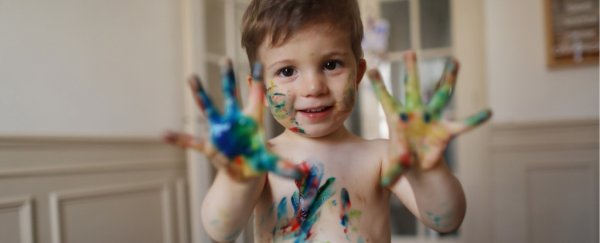Understanding what's going on in the mind of toddlers is helpful in improving everything from education and parenting to pre-school entertainment, and new research sheds light on how these young kids react to a feeling we've all had at some point: uncertainty.
In tests with a total of 160 toddlers aged between 25 and 32 months, the kids were shown to handle uncertainty in a variety of ways that matched what older children and adults do, even if toddlers can't actually articulate what's going through their minds.
While kids of this age are known to be able to make smart decisions – like turning to an adult for help when they don't know what to do – much less is known about how they make those decisions, or how aware they are of their own uncertainty.
"Little children show behaviours that suggest they can respond to uncertain situations," says child development psychologist Simona Ghetti, from the University of California, Davis.
"But are these behaviours grounded in their evaluations of actual evidence? And how do very young children become aware they are uncertain?"
To find out, Ghetti and the team ran experiments where the young kids were shown pairs of animals or common objects, with each image almost completely obscured by a grey square. The participants were then asked to find a particular animal or object.
Using eye-tracking devices and touchscreens, as well as what's known as a drift-diffusion model (which describes accuracy and reaction times in adult decision making), the researchers were able to gain some more insight into how the toddlers were deciding on their choices.
"We can look at behaviour like how they are distributing their looks to find useful information, how they go back and forth between images, or whether they take extra time before responding," says psychologist Sarah Leckey, from UC Davis.
"We can see if they act as if they are more or less confident."
Similar to adults, the study showed kids take longer to deliberate over decisions that are more difficult, and in the tests the kids ultimately got wrong, they looked back-and-forth between images more often, seemingly deliberating longer. When the two objects were similar, the kids took longer to gather their 'evidence' but needed less of that evidence to reach a decision.
These responses, the researchers suggest, show toddlers starting to become aware of their own uncertainty, matching behaviours that are also seen in more developed children and in adult decision making – as adults we also take longer to deliberate over decisions that we're not sure about, for example.
Of course, there are limitations to the study. The sample size is smaller than one that would usually be used for a drift-diffusion model, the researchers say. The team aimed to overcome this by repeating their experiments, instead.
Still, studies like this help us to understand how our ability to make decisions as grown-ups actually gets started.
Decision making might not be the only skill that emerges in toddlers earlier than we thought, their number-counting prowess after the age of about 12 months has been highlighted in a recent study too. Our little selves might be more sophisticated than we give them credit for.
"Overall, we showed that, while deliberating, toddlers exhibit a repertoire of behaviours that reflect gathering and assessment of evidence and decision-making processes, which are also engaged in overt uncertainty monitoring," write the researchers in their published paper.
The research has been published in Nature Human Behaviour.
